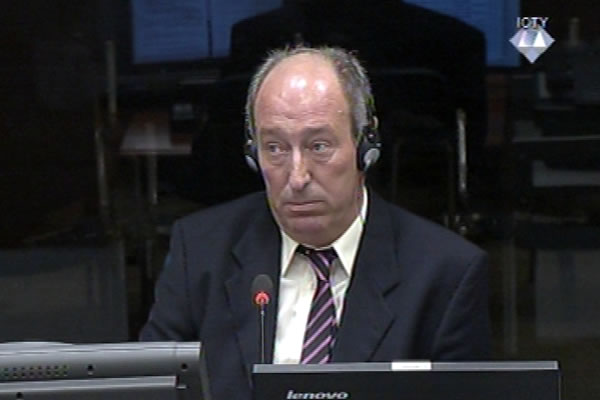Home
HOW FOCA BECAME SRBINJE
Former president of the Foca municipal executive board Radojica Mladjenovic denied that Muslims had been expelled from Foca. He did admit that the town that before the war had the same percentage of Serbs and Muslims turned into a ‘Serb municipality’ with a 99 per cent Serb majority. The witness contested the allegation that the town's name was changed to Srbinje to reflect that. There was a need to make the name rhyme with the names of the neighboring municipalities of Trebinje, Ljubinje, etc.
 Radojica Mladjenovic, defence witness at Rako Mladic trial
Radojica Mladjenovic, defence witness at Rako Mladic trial In his evidence in Ratko Mladic’s defense Radojica Mladjenovic, the wartime president of the Foca Executive Board, claimed that the conflict in the town broke out because the Muslim side was not amenable to agreements. According to Mladjenovic, the agreement to split the municipality between the local boards run by the Serbian Democratic Party and the Party of Democratic Action was reached on 8 April 1992. That same day, Muslims pulled out of the agreement and launched an attack. The Serbs could only fight back and capture the whole territory of the municipality.
In the cross-examination, prosecutor Bibles put it to the witness that the Serb municipality of Foca was formed as early as in December 1991, in line with the instructions of the SDS Main Board. The document, known as the Variant A and B, provided a blueprint for the seizure of the municipalities with a Serb majority, and those where the Serbs were a minority. The witness claimed that he never received any instructions. He did not rule out the possibility that other municipal officials knew about them. The prosecutor alleges that the parts of BH that were to belong to Serbs were captured in line with the plan drafted by the Bosnian Serb leadership and that afterwards the territory was ethnically cleansed from Muslims and Croats.
Today in the evidence and in his statement to the defense team, the witness said that Muslims leftFoca on their own:‘Serbs did not expel them’. They followed their leaders and soldiers once it became clearthey would be defeated. The witness didn’t deny that there were some crimes in Foca, but exonerated the army which was under the command of the accused. Mladjenovic blamed the paramilitary groups from Serbia that had come to Foca to rob and loot. The witness heard some rumors about beatings in the Foca Correctional and Penal Facility, but in his view, the army was not responsible for that. The witness denied that baseball bats were used to maltreat the prisoners. It was ‘absolutely impossible’for such sports equipment to be found in Foca.
Noting that the ethnic cleansing plan yielded extraordinary results in Foca, the prosecutor showed a speech made by Petko Cancar, a deputy,in the Bosnian Serb Assembly in April 1993. Cancar said that there was now‘only one nation and only one religion’in the town. The prosecutor also showed an entry from Mladic's war diary. The entry is about a meetingon 17 September 1992, and Mladic notes that the president of the Foca Crisis Staff Miroslav Stanic said there were 42,000 inhabitants in Foca before the war: 51 per cent Muslims and 49 per cent Serbs. The percentage of Serbs then increased to 99 per cent. The witness agreed with the claim that in the course of the war Foca became a pure‘Serb municipality’.
Because of the drastic change in the ethnic composition of the town, the prosecutor put it to the witness, an idea mooted to change the name of the town from Foca to Srbinje. Mladjenovic agreed that it was an ‘unprincipled and unnecessary’move on the part of the municipal authorities. He personally was against it. The witness didn’t agree that the new name was adopted to reflect the new ethnic reality in the town. There was a need for the name to rhyme with the names of neighboring municipalities –Trebinje and Ljubinje.Veselinko Simovic, a member of the Foca Intervention Platoon, who also testified in Mladic’s defense, offered the same ‘poetic’explanation. He added the town of Nevesinje to the rhyme.
As today’s hearing drew to a close, Mladic’s defense called a new witness, the war-time president of the Milici municipality, Tomislav Savkic.
Linked Reports
- Case : Mladic
- 2014-10-20 RESPONSIBILITY OF THE ARMY FOR EXECUTION OF PRISONERS IN RASADNIK FARM
- 2014-10-16 CRIME COMMITTED BY ‘DERANGED PERSON’ OUT OF MLADIC’S CONTROL
- 2014-10-15 PROSECUTOR IGNORES WITNESS’S EULOGIES ABOUT MLADIC
- 2014-10-22 DNA ANALYSIS CONTRADICTS SREBRENICA GENOCIDE DENIAL
- 2014-10-23 PROSECUTION MOTION TO CALL EVIDENCE ON TOMASICA GRANTED
- 2014-10-23 RHYME DID NOT WORK FOR EVERYONE
